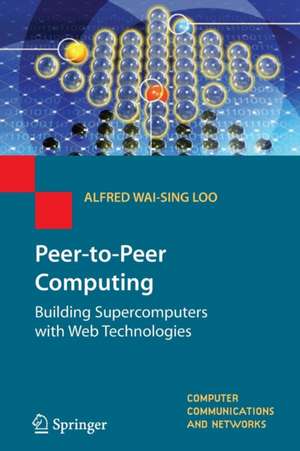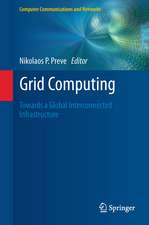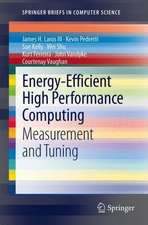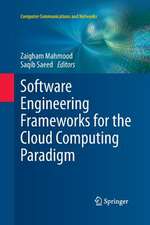Peer-to-Peer Computing: Building Supercomputers with Web Technologies: Computer Communications and Networks
Autor Alfred Wai-Sing Looen Limba Engleză Paperback – 29 dec 2006
Companies are again searching for ways to improve their processing power without further investment in new hardware and software. Many client computers are idle most of the time, and have unused disk space. The next logical step is to maximise the use of these computers. The peer-to-peer (P2P) model is the answer.
A new and simple peer-to-peer model will be introduced in this book, which will teach readers to install peer-to-peer systems in which users can share their computing power. The target readers are those who have basic Java knowledge and are interested in building (or testing the performance of) peer-to-peer systems.
Din seria Computer Communications and Networks
- 20%
 Preț: 378.18 lei
Preț: 378.18 lei - 20%
 Preț: 684.74 lei
Preț: 684.74 lei - 20%
 Preț: 218.21 lei
Preț: 218.21 lei - 20%
 Preț: 1013.39 lei
Preț: 1013.39 lei - 20%
 Preț: 368.78 lei
Preț: 368.78 lei - 20%
 Preț: 505.48 lei
Preț: 505.48 lei - 20%
 Preț: 646.80 lei
Preț: 646.80 lei - 20%
 Preț: 609.08 lei
Preț: 609.08 lei - 20%
 Preț: 765.60 lei
Preț: 765.60 lei - 20%
 Preț: 339.47 lei
Preț: 339.47 lei - 20%
 Preț: 597.29 lei
Preț: 597.29 lei - 20%
 Preț: 655.85 lei
Preț: 655.85 lei - 20%
 Preț: 997.06 lei
Preț: 997.06 lei - 20%
 Preț: 351.89 lei
Preț: 351.89 lei - 20%
 Preț: 902.00 lei
Preț: 902.00 lei - 20%
 Preț: 996.22 lei
Preț: 996.22 lei - 20%
 Preț: 644.81 lei
Preț: 644.81 lei - 15%
 Preț: 650.69 lei
Preț: 650.69 lei - 20%
 Preț: 650.73 lei
Preț: 650.73 lei - 20%
 Preț: 373.91 lei
Preț: 373.91 lei - 20%
 Preț: 646.95 lei
Preț: 646.95 lei - 20%
 Preț: 1004.99 lei
Preț: 1004.99 lei - 20%
 Preț: 646.80 lei
Preț: 646.80 lei - 20%
 Preț: 341.81 lei
Preț: 341.81 lei - 20%
 Preț: 656.19 lei
Preț: 656.19 lei - 20%
 Preț: 651.75 lei
Preț: 651.75 lei - 20%
 Preț: 331.08 lei
Preț: 331.08 lei - 20%
 Preț: 650.40 lei
Preț: 650.40 lei - 20%
 Preț: 988.66 lei
Preț: 988.66 lei - 20%
 Preț: 643.97 lei
Preț: 643.97 lei - 20%
 Preț: 761.44 lei
Preț: 761.44 lei - 20%
 Preț: 332.71 lei
Preț: 332.71 lei - 20%
 Preț: 345.59 lei
Preț: 345.59 lei - 20%
 Preț: 332.06 lei
Preț: 332.06 lei - 20%
 Preț: 996.22 lei
Preț: 996.22 lei - 20%
 Preț: 644.15 lei
Preț: 644.15 lei - 20%
 Preț: 326.64 lei
Preț: 326.64 lei - 20%
 Preț: 320.19 lei
Preț: 320.19 lei - 20%
 Preț: 1013.06 lei
Preț: 1013.06 lei - 20%
 Preț: 642.52 lei
Preț: 642.52 lei - 20%
 Preț: 641.01 lei
Preț: 641.01 lei - 20%
 Preț: 718.56 lei
Preț: 718.56 lei - 20%
 Preț: 1043.41 lei
Preț: 1043.41 lei
Preț: 329.44 lei
Preț vechi: 411.80 lei
-20% Nou
Puncte Express: 494
Preț estimativ în valută:
63.04€ • 66.17$ • 52.32£
63.04€ • 66.17$ • 52.32£
Carte tipărită la comandă
Livrare economică 10-24 aprilie
Preluare comenzi: 021 569.72.76
Specificații
ISBN-13: 9781846283819
ISBN-10: 1846283817
Pagini: 278
Ilustrații: X, 268 p. With online files/update.
Dimensiuni: 155 x 235 x 13 mm
Greutate: 0.34 kg
Ediția:2007
Editura: SPRINGER LONDON
Colecția Springer
Seria Computer Communications and Networks
Locul publicării:London, United Kingdom
ISBN-10: 1846283817
Pagini: 278
Ilustrații: X, 268 p. With online files/update.
Dimensiuni: 155 x 235 x 13 mm
Greutate: 0.34 kg
Ediția:2007
Editura: SPRINGER LONDON
Colecția Springer
Seria Computer Communications and Networks
Locul publicării:London, United Kingdom
Public țintă
ResearchCuprins
Overview of Peer-to-Peer System.- File-Sharing Peer-to-Peer System.- The Need for More Powerful Computers.- Problems and Solutions.- Web Server and Related Technologies.- to Servlets.- Java Network Programming.- Testing and Enhancements of Servlets.- Power Server: Model 1.- Power Server: Model 2.- Power Server: Model 3.- Power Server: Model 4.- Power Server: Model 5.- Wireless P2P System.- Implementation of Wireless P2P Systems.- Computer Architecture.- Distributed and Parallel Algorithms.- Infrastructure and Future Development.
Notă biografică
The author is a lecturer at Lingnan University in Hong Kong and also has the following accreditations.
BSc, MSc, PhD.
Chartered Engineer, United Kingdom.
Chartered Mathematician, United Kingdom.
Chartered Information Technology Professional, United Kingdom.
He has been a member of the Scientific Committee of the International Conference on Distributed Computing and Applications to Business, Engineering and Science in 2001, 2002 and 2004. They are planning to hold the next conference in London in late 2005 or early 2006.
Chartered Engineer, United Kingdom.
Chartered Mathematician, United Kingdom.
Chartered Information Technology Professional, United Kingdom.
He has been a member of the Scientific Committee of the International Conference on Distributed Computing and Applications to Business, Engineering and Science in 2001, 2002 and 2004. They are planning to hold the next conference in London in late 2005 or early 2006.
Textul de pe ultima copertă
Client/Server architecture was first proposed in the late 1980s as an alternative to conventional mainframe systems. Mainframe processing quickly becomes a bottleneck in any information system, but client/server models shift the processing burden to the client computer. Through workload sharing, client/server systems can improve overall efficiency while reducing budgets.
Companies are again searching for ways to improve their processing power without further investment in new hardware and software. Many client computers are idle most of the time, and have unused disk space. The next logical step is to maximise the resources of these computers, and the peer-to-peer (P2P) model is the answer.
A new and simple peer-to-peer model will be introduced in this book. In it:
Companies are again searching for ways to improve their processing power without further investment in new hardware and software. Many client computers are idle most of the time, and have unused disk space. The next logical step is to maximise the resources of these computers, and the peer-to-peer (P2P) model is the answer.
A new and simple peer-to-peer model will be introduced in this book. In it:
- Readers will be taught to install peer-to-peer systems which can then manage and distribute the processing power of any number of clients.
- The size of network can range from two to over a million computers.
- The software necessary to implement peer-to-peer systems quickly can be downloaded from the book’s website at www.springer.com/1-84628-381-7/
Caracteristici
The reader will learn how to build their own P2P system A new P2P model will be introduced Software will be provided Examples will be given so that readers can test different approaches The model can support 2 to several million computers Java will be used as the programming language and can be implemented on different platforms Wireless P2P systems will be presented in the book
















